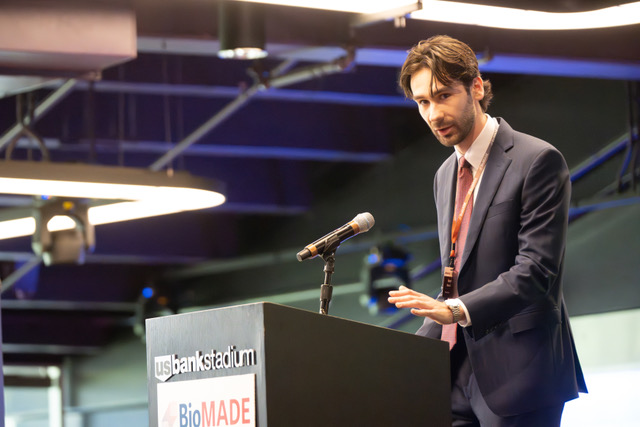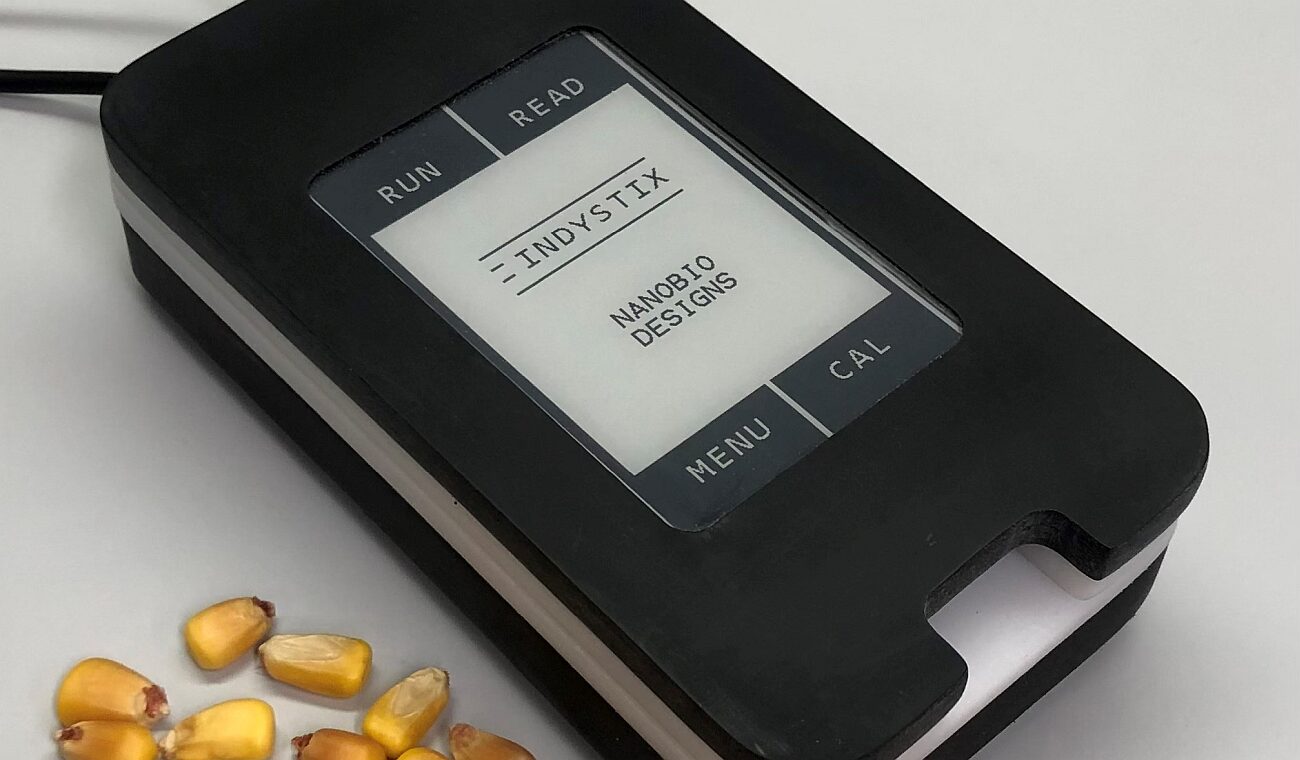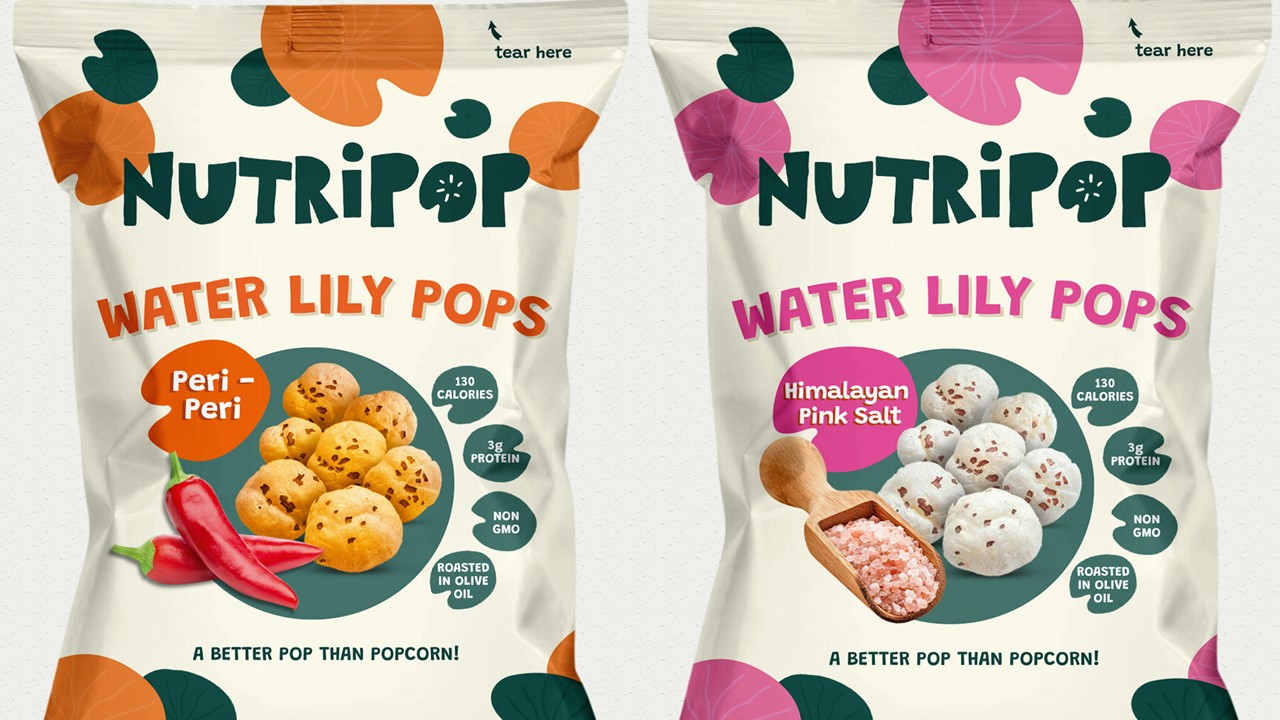
NanoBio Designs, which offers rapid onsite DNA testing for grains; Integrated Dynamics, which engineers microbes to convert low-cost biomass into high-value outputs; and NutriPop, which makes popped water lily seed snacks, have scooped the top prizes in an innovation accelerator run by AgriNovus, a nonprofit dedicated to growing Indiana’s agbioscience economy.
The three winners, which each secured a $25k prize, were among 42 startups participating in Velocity, a six-month accelerator program run by AgriNovus in partnership with the Indiana Corn Marketing Council, Indiana Soybean Alliance, Elevance Health, Beck’s Hybrids, Ag Alumni Seed, and Gutwein Law.
While some accelerators provide fairly generic programing, says program leader Geoff Zentz, Velocity “really focuses on figuring out what success looks like to each company individually and identifies the KPIs and metrics that are relevant.”
Velocity launched in January and replaces two innovation challenges AgriNovus used to run, “which were 7-9-week sprints where we’d identify a problem and send out an open call to innovators,” says Zentz. “But for very early-stage founders, seven weeks isn’t enough if you’re asking them to compete with a far more established company.
“We also heard from sponsors and other stakeholders that it was hard to engage meaningfully with startups in such a short time window. Velocity gives them more time to meet subject matter experts, mentors, investors, and potential customers, culminating in a demo day.”
There are three tracks: bioinnovation, farm-focused innovation, and food-is-health, with each startup allocated to one of these tracks and supported by curated subject matter experts. They are then assessed by judges with relevant expertise.
Given AgriNovus Indiana’s remit, “We want to impact an Indiana customer first; that’s the intention of the program,” says Zentz. “But the teams don’t have to be based here, so we’ve had student entrepreneurs from West Lafayette, Indiana, but also companies based out of Italy and Canada who want to see if we can help them open doors or make connections.”
As for the areas of focus, he says. “It’s everything from using waste streams to create new products, to developing foods for certain patient populations, to using computer vision on-farm.”
Early engagement with potential customers, partners
Above all, says Zentz, startups need to engage with potential customers and partners as early as possible, especially in the bioinnovation space, where non-dilutive funding from government grants and other sources is being scaled back.
“This is a sad note, but we had three companies in this cohort that decided to pause operations because of cash flow issues. One of the things I’m personally very concerned about is the loss of non-dilutive funding sources. I fear we’re going to look back in 10 years and see that innovation has slowed because we weren’t able to help these companies de-risk at that early stage when it’s really hard to attract venture capital.”
All startups, meanwhile, benefit from early feedback from potential customers, both positive and negative, he says. If you’re not actually solving a real problem, he points out, it’s better to find out sooner rather than later, “although nobody wants to tell anybody their proverbial baby is ugly.”
‘The coolest job in the world’
Zentz is “biased, obviously,” but says the combination of low living costs (critical at the bootstrapping phase of any business), access to major markets, and a rich agbioscience ecosystem make Indiana an extremely attractive place to start an ag bioscience business.
“I have the coolest job in the world. I get to be this additional layer of support for early-stage companies, from innovators that don’t even have an idea yet to companies that are on market but want to get to the next level, to plug them in [to the local agbioscience ecosystem] and find the things that move the needle for them.”

BIOINNOVATION WINNER: Integrated Dynamics
Integrated Dynamics is developing a biomanufacturing platform deploying genetically engineered ‘hyperthermophile’ organisms that thrive in high temperatures to convert low-cost organic feedstocks such as ag waste, wood pulp or other sources of cellulosic biomass into ethanol, acetone, hydrogen and other products using existing corn-to-ethanol infrastructure.
While firms running corn ethanol plants using yeast currently heat up ground and mashed corn to high temperatures, add enzymes to release the starch, and then cool everything down to 35ºC for the fermentation, Integrated Dynamics runs its whole process at >85ºC.
This dramatically speeds up ethanol production and enables continuous fermentation because fermenters don’t have to be regularly reset to ensure the yeast doesn’t die from ethanol poisoning, says cofounder Henry Markarian.
“Our high temperature process allows volatiles such as ethanol or acetone to vaporize out of solution as they’re produced. So you can just keep feeding and keep distilling in a continuous rather than a batch process, which reduces the total equipment needed and increases equipment utilization.”
High temperatures also prevent unwanted microbial contaminants from inhibiting the process, he added. “No microbe you would reasonably expect to encounter outside the reactor could survive within it.”
Large ethanol producers are not going to switch to Integrated Dynamics’ process overnight, but a first step might include adding some dried distillers’ grains (a co-product of corn ethanol production that currently goes to low-value feed markets) or cellulosic biomass such as corn stover or wood chips along with corn to produce the same amount of ethanol with lower feedstock costs, he says.
He adds: “There’s no way that somebody walks up to a multi-million-dollar facility and says change everything. But you can make more money out of your co-products if you dedicate one of your fermenters to our technology. You can still put corn in it, but blend in some of that extra co-product, whatever you find hard to sell. And because our process allows you to expand from just corn to cellulosic material, you can get much better margins because you can use lower cost feedstocks. You can also capture [renewable fuel standard] credits.”
For a partner to get started, the costs are relatively small, he claims: “All we would need do is repaint the inside [of a fermenter], put some insulation on the outside, and then put in a fan system so you can handle the vapor.”
Integrated Dynamics has demonstrated its tech at the 50-liter scale, and next year hopes to prove it at “about 100 times larger than that,” says Markarian. The aim is to commercialize the tech at an ethanol plant with a partner at industrial scale in 2028.
“We’re talking about very small capital improvements to create very big biological improvements.”

FARMER FOCUSED INNOVATION WINNER: NanoBio Designs
NanoBio Designs provides rapid, on-site and cost-effective DNA testing services that enable grain distributors to detect genetic markers in relatively crude samples to determine if they meet Non-GMO criteria required by buyers.
Right now, firms can use on-site lateral flow testing strips [which use antibodies to bind and detect proteins expressed by a GM crop], but they are not 100% reliable, and can sometimes deliver false positives, says NanoBio Designs COO Ryan Skaar.
They can also deliver false negatives if the GM variety you seek to detect, for example, is engineered to produce proteins to help resist drought, he says. “If it’s not a drought year, that protein may not be activated.” In such a case, while the crop is GM, the strip test would come back negative, as it is only looking for specific proteins, not DNA.
The alternative is to send samples to third party labs for pricey PCR testing. However, this can take a few days to turn around—not ideal if you have a truck waiting and want to get a rapid ‘yes’ or ‘no’ before emptying the contents into your grain elevator, notes Skaar.
NanoBio Designs, by contrast, makes tests containing particles pre-programmed with a unique DNA sequence that will bind with a complementary sequence in a GM crop sample. As the sequences for all the key GM crops are publicly available, NanoBio Designs can create tests for all the key varieties, says Skaar. “We can also work with seed developers to develop tests specific to their new varieties in a matter of weeks, whereas if you’re developing a PCR test or strip test, it can take a year.”
The testing package includes a portable device that can be used again and again, coupled with single-use testing sticks, says Skaar, who says NanoBio Designs has started to generate revenues from paid pilots with Kent Corporation and an undisclosed leading ag company.
“If we can do around 17,000 tests and 36 units annually, that would take us to breakeven.”

FOOD IS HEALTH WINNER: NutriPop
NutriPop pops water lily seeds in olive oil to meet demand for high-protein, low-calorie, low-GI, plant-based snacks. Founded by University of Notre Dame MBA students Ujaswin Jain, Rishi Reddy, Audrey Chung, and David Nemer, the startup is gearing up to launch the snacks this fall.
The snacks will initially be produced in India via a co-packer with production potentially moving to the US should the brand gain traction, says Jain. While popped water lily seed snacks, known as Makhana in India, have picked up some traction in the US in recent years through brands such as Taali and AshaPops, NutriPop is looking to tweak them for the Gen Z American consumer, says Chung.
“Several of the companies selling them in the US have flavors that you see in India such as tikka masala, tandoori, turmeric, mint, and so on. They are really tasty, but they don’t always appeal to your average American consumer. We are creating flavors designed for the American palate, so think cheddar cheese, caramel, sour cream and onion, and barbecue.”
The startup, which has been testing and refining the flavors and textures with Notre Dame students as guinea pigs, is still finalizing its go-to-market strategy, but is currently in discussions with a leading Midwest distributor.
A direct-to-consumer launch is something it may consider at the tail end of the year, says NutriPop, which has survived thus far on funding from non-dilutive sources such as awards and grants.

Further reading:
BiomEdit CEO: Next gen designer probiotics will disrupt the animal and human health market
The post From super-heated bioreactors to rapid onsite GMO tests: Meet the AgriNovus Velocity winners appeared first on AgFunderNews.




